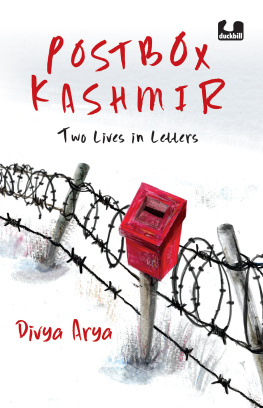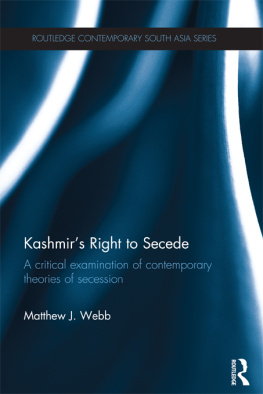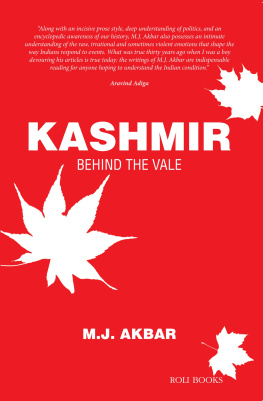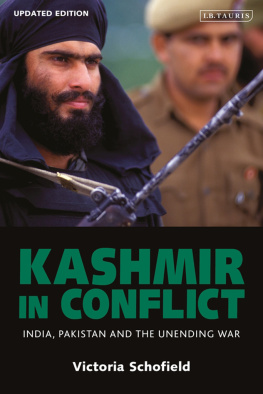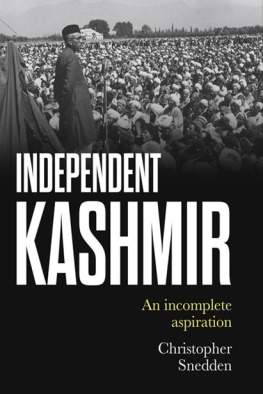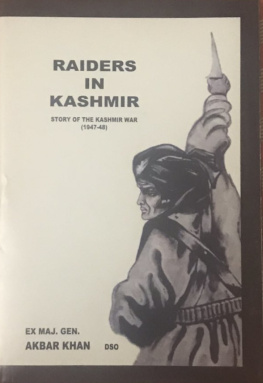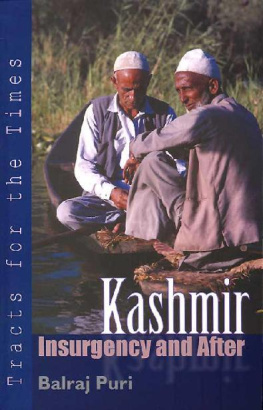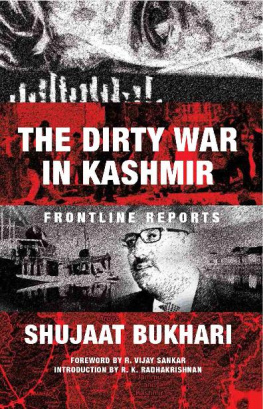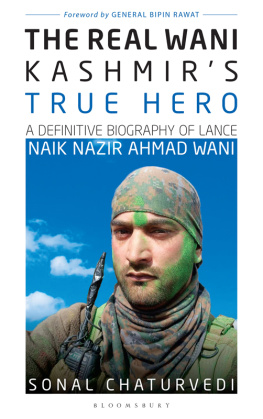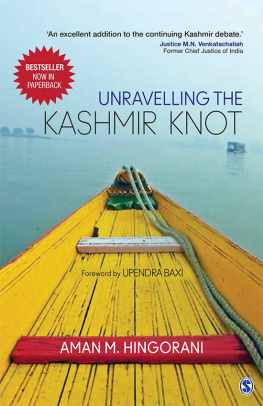Wani - What Happened to Governance in Kashmir?
Here you can read online Wani - What Happened to Governance in Kashmir? full text of the book (entire story) in english for free. Download pdf and epub, get meaning, cover and reviews about this ebook. year: 2018, publisher: OUP India, genre: Politics. Description of the work, (preface) as well as reviews are available. Best literature library LitArk.com created for fans of good reading and offers a wide selection of genres:
Romance novel
Science fiction
Adventure
Detective
Science
History
Home and family
Prose
Art
Politics
Computer
Non-fiction
Religion
Business
Children
Humor
Choose a favorite category and find really read worthwhile books. Enjoy immersion in the world of imagination, feel the emotions of the characters or learn something new for yourself, make an fascinating discovery.

- Book:What Happened to Governance in Kashmir?
- Author:
- Publisher:OUP India
- Genre:
- Year:2018
- Rating:4 / 5
- Favourites:Add to favourites
- Your mark:
- 80
- 1
- 2
- 3
- 4
- 5
What Happened to Governance in Kashmir?: summary, description and annotation
We offer to read an annotation, description, summary or preface (depends on what the author of the book "What Happened to Governance in Kashmir?" wrote himself). If you haven't found the necessary information about the book — write in the comments, we will try to find it.
Wani: author's other books
Who wrote What Happened to Governance in Kashmir?? Find out the surname, the name of the author of the book and a list of all author's works by series.
What Happened to Governance in Kashmir? — read online for free the complete book (whole text) full work
Below is the text of the book, divided by pages. System saving the place of the last page read, allows you to conveniently read the book "What Happened to Governance in Kashmir?" online for free, without having to search again every time where you left off. Put a bookmark, and you can go to the page where you finished reading at any time.
Font size:
Interval:
Bookmark:
What Happened to Governance in Kashmir?
What Happened to Governance in Kashmir?
Aijaz Ashraf Wani


Oxford University Press is a department of the University of Oxford.
It furthers the Universitys objective of excellence in research, scholarship,
and education by publishing worldwide. Oxford is a registered trademark of
Oxford University Press in the UK and in certain other countries.
Published in India by
Oxford University Press
2/11 Ground Floor, Ansari Road, Daryaganj, New Delhi 110 002, India
Oxford University Press 2019
The moral rights of the author have been asserted.
First Edition published in 2019
All rights reserved. No part of this publication may be reproduced, stored in
a retrieval system, or transmitted, in any form or by any means, without the
prior permission in writing of Oxford University Press, or as expressly permitted
by law, by licence, or under terms agreed with the appropriate reprographics
rights organization. Enquiries concerning reproduction outside the scope of the
above should be sent to the Rights Department, Oxford University Press, at the
address above.
You must not circulate this work in any other form
and you must impose this same condition on any acquirer.
ISBN-13 (print edition): 978-0-19-948760-8
ISBN-10 (print edition): 0-19-948760-X
ISBN-13 (eBook): 978-0-19-909715-9
ISBN-10 (eBook): 0-19-909715-1
Typeset in Trump Mediaeval LT Std 9.5/13
by The Graphics Solution, New Delhi 110 092
Printed in India by Nutech Print Services India
Contents
When I joined the Department of Political Science, University of Kashmir, as a student I would often hear from the distinguished Kashmir experts that the Kashmir issue was no doubt basically a political problem, but the patterns of rule, right from the demise of the princely order, had added fuel to the fire. At that stage I could not appreciate the import of this observation. But when my PhD supervisor, Professor Gull Mohammad Wani, suggested that I work on governance in Kashmir, the significance of the observation I used to hear during my novitiate days started unfolding with my reading of secondary works followed by a variety of primary sources. Thus the intellectual seeds of this book were sown during my PhD work. Immediately after the award of my degree in early 2014, I started to build upon my research in order to transform it into a book. I approached Oxford University Press for its publication. As per their set procedure, the publisher sent the manuscript to two anonymous reviewers who, while recommending it for publication, made some significant suggestions for its improvement. While making improvements in the light of their suggestions, the work has emerged as a substantial improvement over the original one, and I have no words to express my heartfelt thanks to the reviewers who unfortunately continue to remain anonymous to me.
This work is the outcome of the immense help I received from my teachers, friends, family, and well-wishers. It is my pleasure to thank them all. Professor Gull Mohammad Wani and his family always treated me as a family member besides having groomed me for a serious role in academics. I have no words to express my heartfelt gratitude to them.
I owe an immense debt to Professor Ayesha Jalal, Professor of History at Tufts University, USA, and Professor Niraja Gopal Jayal, Centre for the Study of Law and Governance, JNU, for their graciousness in accepting my request to opine on this book. I am greatly thankful to Professor Mark Bevir, Professor Rod Rhodes, Professor Haley Duschinski, Professor Amit Prakash, Alexander Evans, Professor K. C. Suri, Professor Ujjwal Kumar Singh, Professor Rekha Chowdhary, and Professor G. R. Malik for their help and guidance.
To my teachers and colleagues at the Department of Political Science, University of Kashmir, Professor Noor Ahmad Baba, Professor Asifa Jan, Professor Ravinderjit Kour, Professor Irshad Ahmad Shah, Dr Naseema, Dr Nazir Ahmad, Dr Anjum Ara, Dr Sanjeda Warsi, and Dr Javid, my debts are infinite.
I am also indebted to all those authors whom I quoted with their gracious permission.
This work has benefited immensely from discussions with my friend Javid ul Aziz. I thank him. My friends and well-wishers Ajaz ul Haq, Dr Mehmood ur Rashid, Bilal Ahmad Bhat, Mudasir Ahmad, Altaf Para, Inam-ul-Rehman, Tanveer Habib, Shahzad Wani, Neelofer, Feroz Ahmad Wani, Abdul Rouf, Tabzeer Yaseen Sajjad, Sakeena, Shahnawaz, Showket, Imran, Qayoom, Arshid, Tanveer, Imran, Muzamil, Irfan and Shazia rendered invaluable help. Words fail me in thanking them.
Farooq and Mehraj, my students as well as friends, deserve special thanks. I am sure without their unflinching support this work would not have been possible.
Special thanks to all my students who keep pushing me to work harder. I enjoy their company the most, and their inquisitiveness makes me an unending learner.
My combative debates and discussions with my friend, philosopher, guide, and teacher, my father Professor Mohammad Ashraf Wani, former Professor of History, University of Kashmir, gave a historians touch to this work. I shall be failing in my duty if i do not thank Professor A. Q. Rafiqi, former Professor of History, University of Kashmir, who not only initiated my father into the field of research, but also showed equal zeal and zest in my academic growth as well.
I am thankful to the non-teaching staff of my department, library staff of the Centre for Law and Governance, New Delhi, Indian Institute of Public Administration, New Delhi, Legislative Assembly, J&K, the Jammu and Kashmir Archives, Research and Reference Library, Department of Information J&K Government, Directorate of Economics and Statistics, Srinagar, and the Coalition of Civil Society, Srinagar, for their ungrudging cooperation. I am immensely grateful to my respondents in the field, who for various reasons wanted to remain anonymous, for their valuable feedback.
I would like to thank the editorial team of Oxford University Press, New Delhi, for their cooperation.
The love and support I received from Dr Aman Ashraf, Dr Shazia, Dr Javid Ahmad, Dr Fehmeeda, Dr Gowhar, Dr Sabina, Mukhtar Bhai, Rehana Baji, Dr Javid Ahmad Bhat, Arena Baji, Abu, Khali, Dr Shajer us Shafiq Jan, Dr Deeba, Rafiqa, Mr Ajaz, Mrs and Mr Gh. Rasool Bafanda, Mrs and Mr S. N. Jan, Mrs and Mr Gh. Hassan, Mrs and Mr Ab Rehman Shah, Mrs and Mr Ab. Karim Mohand, and Mrs and Mr Mohammad Abdullah is beyond words. Asifa, Aadil, Moonis, Tuba, Touyiba, Taha, Anas, Tazkiya, Basim, Zahra, Aayesha, Faliha, Nuha, Hayda, Usman, Hurrain, Adiyan, Izan, Kulsum, and Abida were a great source of joy throughout the period of study.
Dr Shaheena, my wife, and my two little children, Mohammad Mousa and Samra Noor, bore with exemplary patience my preoccupation with this work for months together when I should have been with them. They would feel to have been compensated for their purgatory should this book is seen to have slightly added to the existing body of knowledge on the subject.
This book is for Ami and Abajan, who made me what I am.
| BJP | Bharatiya Janata Party |
| CID | Counter Intelligence Department |
| CRPF | Central Reserve Police Force |
| IADP | Intensive Agricultural Development Programme |
| ICDP | Intensive Cattle Development Project |
| J&K | Jammu and Kashmir |
| JKLF | Jammu Kashmir Liberation Front |
Font size:
Interval:
Bookmark:
Similar books «What Happened to Governance in Kashmir?»
Look at similar books to What Happened to Governance in Kashmir?. We have selected literature similar in name and meaning in the hope of providing readers with more options to find new, interesting, not yet read works.
Discussion, reviews of the book What Happened to Governance in Kashmir? and just readers' own opinions. Leave your comments, write what you think about the work, its meaning or the main characters. Specify what exactly you liked and what you didn't like, and why you think so.

